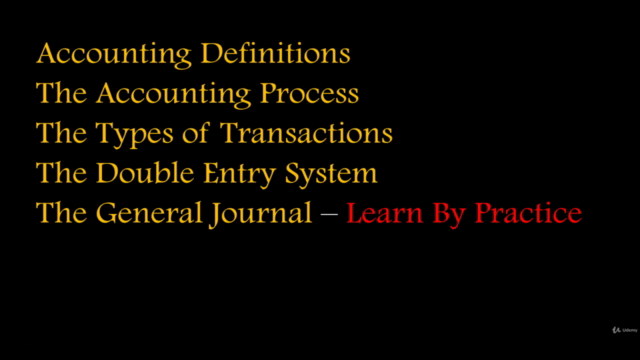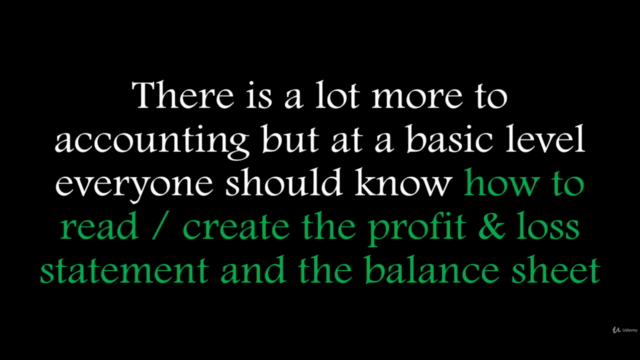Accounting 101 - The Principles Of Accounting

Why take this course?
🌟 Course Title: Accounting 101 - The Principles Of Accounting
Headline: 🚀 The Easiest Course In Accounting! 🚀
Course Description:
Welcome to the gateway of financial mastery – Accounting 101! This is the first course in a comprehensive series designed for absolute beginners who aspire to delve into the world of accounting. 📊✨
Accounting 101 is not just about memorizing formulas or understanding jargon; it's about bringing accounting to life with real-life examples and guiding you through the accounting process step by step. This course is tailored for anyone eager to learn the fundamental concepts of accounting in a manner that is easy to grasp and enjoyable to learn.
As we embark on this journey together, remember that this course is crafted for beginners. It's a gentle pace, ensuring each concept is thoroughly understood before moving on to the next. 🎓💫
What You Will Learn:
In Accounting 101, we will dive into the foundational principles of accounting, including:
- Types of Accounts: Understanding the different types of accounts and their roles in financial statements.
- Assets: Exploring what assets are and how they contribute to a company's financial health.
- Liabilities: Discovering the various forms of liabilities and their importance in financial planning.
- Revenue: Identifying what constitutes revenue and how it is recognized.
- Expenses: Learning about expenses, their classification, and their impact on a company's bottom line.
- Capital: Understanding the concept of capital and its significance in financing business activities.
- Types of Transactions: Mastering the distinction between cash and credit transactions.
- Double Entry System: Getting to grips with this fundamental accounting method that ensures all financial transactions are recorded accurately.
- Rules for Debit & Credit: Learning the golden rules that govern the debits and credits in accounting.
- Passing Journal Entries & Posting Entries To The General Journal: Developing skills to record financial transactions correctly.
Course Outline:
Our journey through accounting begins with:
- Types of Accounts
- What are Assets?
- What are Liabilities?
- What is Revenue?
- What are Expenses?
- What is Capital?
- Types of Transactions, Cash or Credit?
- Double Entry System
- Rules for Debit & Credit
- Passing Journal Entries / Posting Entries To The General Journal
Your Next Steps:
Upon completion of this series, students who are of the proper age will be equipped to pursue entry-level accountant positions. However, to truly excel in the field of accounting, continuous practice and real-world application are key. This course sets you on the path, but your dedication to learning and practicing will bring your newfound knowledge to life.
Continue Your Accounting Journey:
Once you've mastered the principles outlined in Accounting 101, you can continue with the following courses in this Accounting Series:
- Accounting 102 - The Ledger & The Trial Balance
- Accounting 103 - The Special Journals & The Subsidiary Ledgers
- Accounting 104 - Bank Reconciliation & Correction Of Errors
These subsequent courses build upon the foundation established in Accounting 101, leading you towards a comprehensive understanding of accounting and preparing you for more advanced accounting roles. 🌱🔑
Enroll now and take the first step towards becoming an accounting expert with Accounting 101 - The Principles Of Accounting! Let's unlock your potential together. 🎉📚
Course Gallery




Loading charts...
Comidoc Review
Our Verdict
Accounting 101 - The Principles Of Accounting on Udemy offers a comprehensive introduction to accounting principles. While some users find certain concepts confusing, the course has been successful in helping beginners grasp complex topics through clear instruction, engaging examples, and end-of-section testing. Leveraging students' feedback, future iterations of this course should focus on further refining term definitions and incorporating a more substantial set of exercise questions to enhance self-assessment capabilities.
What We Liked
- The course covers the basics of accounting in a clear and concise manner, making it easy for beginners to understand.
- Real-world examples and end-of-section tests help reinforce concepts and ensure retention.
- Instructor's delivery is praised for being clear, concise, and encouraging repetition to help with understanding debits and credits.
- The course was designed to be easy to follow, not overwhelming, and provided a lot of material in a relatively short period.
Potential Drawbacks
- Some users express confusion over concepts such as Cash Paid when classifying accounts, indicating potential for clarity improvement.
- Limited exercise questions are available for self-assessment, reducing opportunities to practice new skills.
- A few users mention previous knowledge is required despite the course being designed for beginners.
- Users recommend a more detailed explanation of specific accounting terms and concepts.